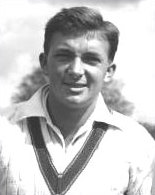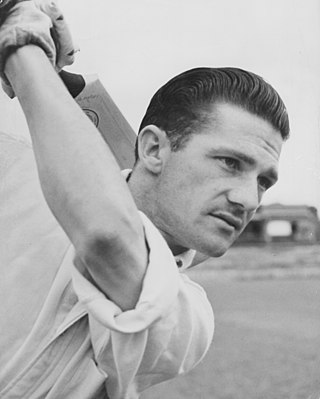Test series summary
No captain of my time has impressed me more than Richie Benaud. Richie had the gift of making you feel you were a better player than you really were. He made his players believe they could win, even when the cause looked utterly hopeless. Nothing illustrated more clearly Richie's adroit handling of men than his leadership of the 1961 Australian team which came to Britain. They should never have won the rubber with those players, but Richie instilled into them his belief in themselves - this attitude that "there is nothing we cannot achieve if we set our minds to it".
- Ray Illingworth [3]
First Test
v | ||
516/9d (152.5 overs) R.N. Harvey 114 N.C.L. O'Neill 82 R.B. Simpson 76 Statham, J.B. 3/147 (43 overs) | ||
- England won the toss and elected to bat.
- 11 June was taken as a rest day.
- W.M. Lawry (AUS) and Murray, J.T. (ENG) made their Test debuts.
Second Test
v | ||
340 (139.3 overs) W.M. Lawry 130 K.D. Mackay 54 Trueman, F.S. 4/118 (34 overs) E.R. Dexter 3/56 (24 overs) | ||
- England won the toss and elected to bat.
- 25 June was taken as a rest day.
- The match was scheduled for five days but completed in four.
- G.D. McKenzie (AUS) made his Test debut.
Third Test
v | ||
299 (149 overs) M.C. Cowdrey 93 Pullar, G. 53 A.K. Davidson 5/63 (47 overs) G.D. McKenzie 3/64 (27 overs) | ||
- Australia won the toss and elected to bat.
- The match was scheduled for five days but completed in three.
Fourth Test
v | ||
190 (63.4 overs) W.M. Lawry 74 B.C. Booth 46 Statham, J.B. 5/53 (21 overs) E.R. Dexter 3/16 (6.4 overs) | 367 (163.4 overs) P.B.H. May 95 Barrington, K.F. 78 Pullar, G. 63 R.B. Simpson 4/23 (11.4 overs) A.K. Davidson 3/70 (39 overs) | |
432 (171.4 overs) W.M. Lawry 102 A.K. Davidson 77* N.C.L. O'Neill 67 Allen, D.A. 4/58 (38 overs) E.R. Dexter 3/61 (20 overs) |
- Australia won the toss and elected to bat.
- 30 July was taken as a rest day.
- B.C. Booth (AUS) and Flavell, J.A. (ENG) made their Test debuts.
Fifth Test
v | ||
256 (118.1 overs) P.B.H. May 71 Barrington, K.F. 53 A.K. Davidson 4/83 (34.1 overs) R.A. Gaunt 3/53 (24 overs) | 494 (165.5 overs) P.J.P. Burge 181 N.C.L. O'Neill 117 B.C. Booth 71 Allen, D.A. 4/133 (30 overs) Statham, J.B. 3/75 (38.5 overs) | |
370/8 (177 overs) R. Subba Row 137 Barrington, K.F. 83 K.D. Mackay 5/121 (68 overs) R. Benaud 3/113 (51 overs) |
- England won the toss and elected to bat.
- 20 August was taken as a rest day.
Five years after their disastrous showing against Jim Laker, the Australians returned to the top of the international tree by retaining the Ashes in England only months after their exciting victory over the West Indies in the memorable Tied test series of 1960–1961 played "Down Under".
The 1961 series was a personal triumph for skipper Richie Benaud, whose match-winning bowling and astute leadership in the fourth Test at Old Trafford proved to be the decisive factor in the series. With the series square, England needed 256 to win and were expected to get them, but Benaud, by bowling his leg breaks round the wicket into some rough created by footmarks, took 6–70 to secure an Australian victory by 54 runs. The key moment came when he bowled the England captain Peter May behind his legs for a duck. The bemused May had to be told by Aussie keeper Wally Grout that he had been bowled.
Australia won the series by drawing the final Test at The Oval and it confirmed a supremacy over England that would endure throughout the decade.
England in 1961 was heavily reliant on the fast bowling of Fred Trueman, then at his peak. It was his brilliant performance at Headingley, where he took 11 wickets in the match, that earned England its only win in the series.
Peter May had missed the start of the series and he relinquished the captaincy at the end of the summer, telling the selectors he did not wish to be considered for any more overseas tours. At the age of 32, he hoped to continue playing for Surrey but, as it turned out, he was lost to the game. He was one of the last amateur cricketers and he decided to make his living in the City of London.




